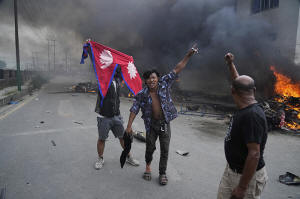Nepal’s prime minister resigns after 19 killed in protests against
social media ban and corruption
[September 09, 2025]
By BINAJ GURUBACHARYA
KATHMANDU, Nepal (AP) — Nepal’s prime minister resigned Tuesday as
protests against a short-lived ban on social media grew increasingly
violent and expanded into broader criticism of his government and
accusations of corruption among the Himalayan country's political elite.
Demonstrations led by young people angry about the blocking of several
social media sites gripped the country’s capital a day earlier, and
police opened fired on the crowds, killing 19 people.
The ban was lifted Tuesday, but the protests continued, with
demonstrators setting fire to the homes of some of Nepal’s top leaders
and the parliament building. The airport in the capital of Katmandu was
shut, and army helicopters ferried some ministers to safe places.
As the protests intensified, Prime Minister Khadga Prasad Oli said he
was stepping down immediately.
The demonstrations — called the protest of Gen Z — began after the
government blocked platforms, including Facebook, X and YouTube, saying
the companies had failed to register and submit to government oversight.
But even after the sites came back online, the rallies continued, fueled
by anger over the deaths of protesters at the hands of police and
growing frustration with the political elite in the nation wedged
between China and India.

In particular, many young people are angry that the children of
political leaders — so-called Nepo Kids — seem to enjoy luxurious
lifestyles and numerous advantages while most youth struggle to find
work. With youth unemployment running at 20% last year, according to the
World Bank, the government estimates that more than 2,000 young people
leave the country every day to seek work in the Middle East or southeast
Asia.
“I am here to protest about the massive corruption in our country,” said
Bishnu Thapa Chetri, a student. “The country has gotten so bad that for
us youths there is no grounds for us to stay.”
Focus turns to the government
On Tuesday, local media and videos shared on social media showed
protesters attacking the residences of the top political leaders in and
around the capital of Kathmandu.
Oli's private home was among those set on fire, as were those of the
president, home minister and the leader of the country's largest party,
Nepali Congress, which is part of the governing coalition. Oli's family
was at the official residence at the time. The home of the leader of the
opposition Communist Party of Nepal (Maoist) was also set ablaze.
A curfew was imposed in the capital and other cities, and schools in
Kathmandu were closed — but several protests continued in the capital
despite the measures.
“Punish the murders in government. Stop killing children,” the
protesters chanted, referring to the deaths at protests a day before.
Police used loudspeakers urging them to return home.
The protesters blamed the government for the police opening fire and
called for the ouster of the increasingly unpopular prime minister.

[to top of second column]
|

Protesters vandalize Nepalese congress party central office during
protests against social media ban and corruption in Kathmandu,
Nepal, Tuesday, Sept. 9, 2025. (AP Photo/Niranjan Shrestha)

“We are here to protest because our youths and friends are getting
killed, we are here to see that justice is done and the present
regime is ousted,” said Narayan Acharya, who was among the
protesters outside the battered wall of the parliament building
Tuesday. "K.P. Oli should be chased away,"
Police fire on crowds
Monday's rallies swelled to tens of thousands of people in Kathmandu
and crowds surrounded the Parliament building before police opened
fire on the demonstrators.
“Stop the ban on social media. Stop corruption, not social media,”
the crowds chanted, waving national flags.
Seven of the 19 killed and scores of the wounded were taken to the
National Trauma Center, the country’s main hospital.
“Many of them are in serious condition and appear to have been shot
in the head and chest,” said Dr. Badri Risa, who works at the
hospital. Families waited for news of their relatives while people
lined up to donate blood.
Before he resigned, Oli said he would form an investigating
committee that would submit a report on the shooting in 15 days. He
added that compensation would be given to the families of those who
were killed and those who were wounded would receive free treatment.
Social media ban seen as part of larger crackdown
The violence unfolded as Nepal's government pursues a broader
attempt to regulate social media with a bill aimed at ensuring the
platforms are “properly managed, responsible and accountable.” The
proposal has been widely criticized as a tool for censorship and for
punishing government opponents who voice their protests online.

The bill would require companies to appoint a liaison office or a
point of contact in the country. Rights groups have called it an
attempt by the government to curb freedom of expression and
fundamental rights.
The registration requirement applied to about two dozen social
networks widely used in Nepal.
Neither Google, which owns YouTube, nor Meta, the parent company of
Facebook, Instagram and WhatsApp, responded to requests for comment
from The Associated Press. Elon Musk’s X platform also did not
respond.
TikTok, Viber and three other platforms have registered and operated
without interruption.
Nepal in 2023 banned TikTok for disrupting “social harmony, goodwill
and diffusing indecent materials.” The ban was lifted last year
after TikTok’s executives pledged to comply with local laws,
including a ban of pornographic sites that was passed in 2018.
All contents © copyright 2025 Associated Press. All rights reserved |